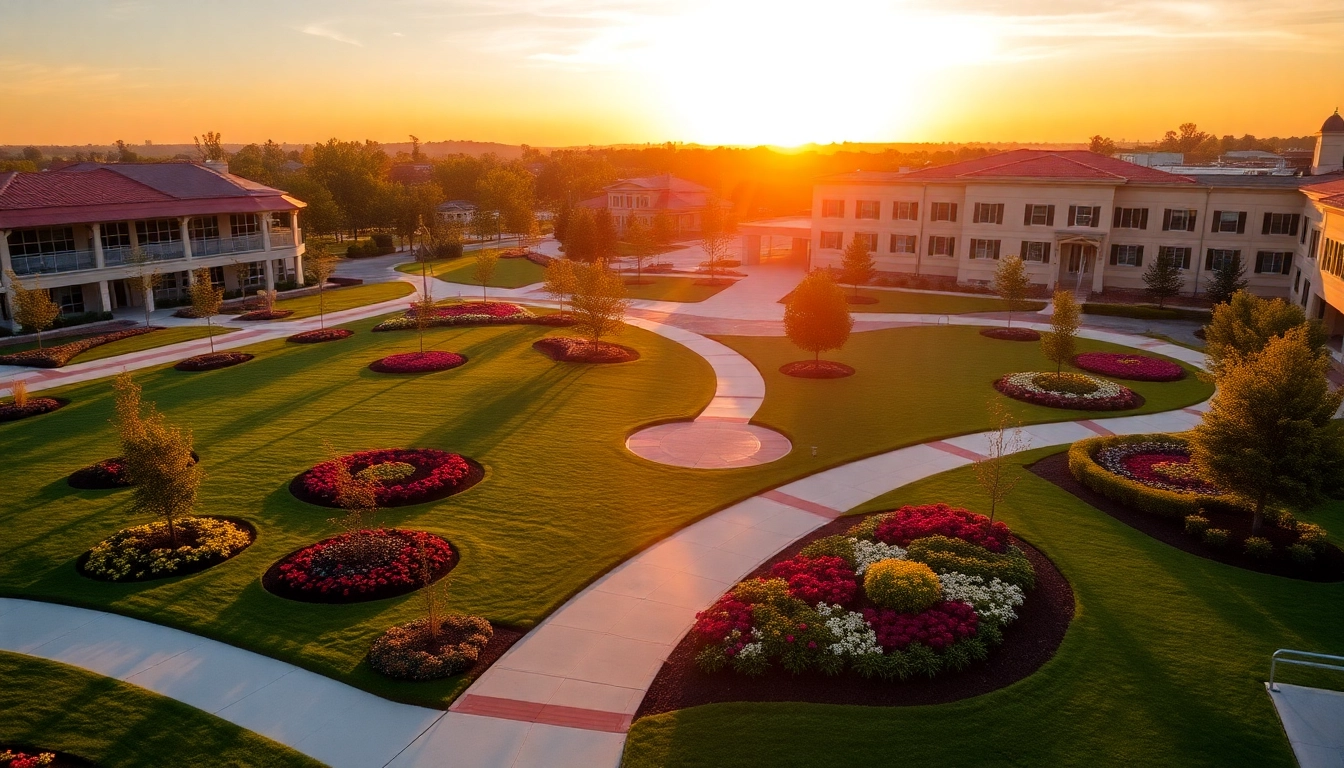Understanding Commercial Landscaping Contractors
In the world of business, first impressions are crucial. The appearance of your commercial property can significantly influence client perceptions and employee morale. That’s where commercial landscaping contractors come into play. These professionals specialize in maintaining and enhancing the outdoor spaces of commercial properties, ensuring they are not only appealing but also functional and sustainable.
What Services Do They Offer?
Commercial landscaping contractors offer a wide array of services that cater to different business needs. These services can generally be grouped into several key categories:
- Landscape Design and Installation: This includes creating layouts that enhance the visual appeal of the property, selecting appropriate plants, and installing features like walkways, water fountains, and patios.
- Maintenance Services: Regular maintenance is essential for keeping landscapes in top shape. Services can include mowing, pruning, mulching, fertilization, and pest control.
- Irrigation Systems: Proper irrigation is crucial for sustaining plant life. Contractors may design and install irrigation systems that conserve water while ensuring adequate coverage.
- Seasonal Services: Many contractors offer seasonal services such as snow removal, seasonal planting, and fall cleanup.
- Consultation Services: Some contractors provide expert advice on the best practices for landscape management and sustainability.
Differences Between Residential and Commercial Landscaping
While both residential and commercial landscaping aim to improve outdoor aesthetics, the scale, complexity, and objectives can differ significantly:
- Scale: Commercial properties often require larger, expansive landscaping designs compared to residential settings, which may be more intimate.
- Design Complexity: Commercial landscapes must balance aesthetics with functionality. Designs often integrate pathways, signage, and seating areas to accommodate larger crowds.
- Maintenance Requirements: Maintenance schedules for commercial properties tend to be more rigorous, as these spaces are subjected to higher foot traffic and need to maintain operational standards.
- Compliance: Commercial properties often need to adhere to strict regulations concerning accessibility, safety, and environmental impact that aren’t typically as relevant in residential landscaping.
Why Quality Matters in Commercial Landscaping
Quality in landscaping is about more than just looks; it reflects a business’s professionalism. A well-maintained landscape can:
- Enhance property value and appeal.
- Promote brand identity through thoughtful design tailored to the company’s image.
- Encourage a positive impression on clients and visitors.
- Provide a safe and enjoyable environment for employees.
- Support environmental sustainability with eco-friendly practices.
Investing in quality landscaping can save companies money in the long run by reducing replacement and repair costs associated with poor maintenance.
How to Choose the Right Contractor for Your Business
Selecting the right commercial landscaping contractor is critical for ensuring that your landscaping project aligns with your business goals. Here are some key considerations:
Key Factors to Consider When Hiring
- Experience: Look for contractors with a proven history in commercial landscaping, particularly in projects similar to yours.
- Portfolio: Review their previous work to assess the quality and style of their designs. Consistency and creativity matter.
- Services Offered: Ensure the contractor offers the specific services you need for your landscape project.
- Insurance and Licensing: Verify that the contractor is properly licensed and insured to protect yourself from potential liabilities.
- Local Knowledge: Contractors familiar with the region will better understand the local climate, soil types, and native plants, leading to healthier landscapes.
Checking Credentials and Reviews
Before finalizing your choice, conduct thorough background research:
- Read Reviews: Look for online reviews on platforms like Google My Business or Yelp. Pay attention to both positive and negative comments.
- Request References: Ask the contractor for references from past clients to get direct feedback about their working relationship and the results achieved.
- Industry Certifications: Check if the contractor holds any industry certifications, which can indicate a commitment to quality and professionalism.
Questions to Ask Before Signing a Contract
Don’t hesitate to ask critical questions that help you understand their approach and guarantees:
- What is your approach to landscape sustainability?
- Can you provide a detailed written estimate?
- What is your timeline for project completion?
- How do you handle updates and changes during the project?
- What are your maintenance recommendations post-installation?
Cost of Services from Commercial Landscaping Contractors
Understanding the cost structures associated with commercial landscaping is key for budgeting effectively. Here’s what to expect:
Averaging Costs and What Affects Pricing
On average, commercial landscaping services can range broadly depending on several factors:
- Size of the Property: More extensive properties will naturally incur higher costs due to increased materials and labor.
- Type of Services Required: Installation of complex features such as irrigation systems, intricate designs, or custom structures will raise costs compared to basic maintenance.
- Geographical Location: The local cost of living and labor rates can significantly influence overall expenses.
- Seasonal Factors: Seasonal demand may affect pricing as contractors adjust for higher demand during prime landscaping seasons.
Value for Investment in Professional Landscaping
While the upfront costs may seem high, investing in quality landscaping can yield significant returns by:
- Enhancing property aesthetics, leading to increased customer interest.
- Improving employee satisfaction and productivity through a pleasant working environment.
- Promoting a sustainable business image through eco-friendly landscaping practices.
Budgeting for Large and Small Projects
When budgeting for landscaping projects, consider breaking down expenses to ensure comprehensive coverage:
- Initial Setup Costs: Include design fees, materials, and installation labor.
- Ongoing Maintenance Costs: Budget for regular upkeep, including mowing, pruning, and seasonal preparations.
- Contingency Funds: Set aside a portion of your budget for unforeseen expenses or changes in project scope.
Trends in Commercial Landscaping
Staying current with landscaping trends ensures that your property not only looks good but is also aligned with modern practices that consumers appreciate. Here are the top trends:
Eco-Friendly and Sustainable Practices
With increasing focus on sustainability, many commercial landscaping contractors are incorporating eco-friendly practices. This can include:
- Using native plants that require less water and attention.
- Implementing rainwater harvesting systems to reduce water usage.
- Creating green roofs and walls to enhance insulation and reduce heat.
Innovative Designs and Technology Integration
Technology is revolutionizing landscaping with tools that optimize installations:
- 3D Design Software: Contractors are using software to visualize projects before implementation, allowing for adjustments and refinements.
- Smart Irrigation Systems: Automating irrigation helps in water conservation, especially during dry seasons.
- Drones: Some contractors utilize drones for surveying large properties and assessing landscape health from above.
Seasonal Changes and Maintenance Strategies
Effective commercial landscaping contractors develop strategies that adjust care according to seasonal needs:
- Winterizing landscapes to protect sensitive plants during cold months.
- Implementing summer strategies to prevent heat stress on plants and lawns.
- Planning spring blooms and fall changes to ensure year-round aesthetic appeal.
Building Long-Term Relationships with Your Landscaping Contractors
Cultivating a successful partnership with your landscaping contractor can lead to ongoing benefits for your company:
Importance of Regular Communication
Establishing open lines of communication can foster a healthy working relationship. Regular discussions about performance, expectations, and any potential changes are crucial for success.
Scheduling Maintenance and Seasonal Services
Consistent scheduling of maintenance and seasonal services ensures that your property remains in optimal condition. A proactive approach can prevent costly repairs and replacements.
Evaluating Contractor Performance Over Time
It’s essential to regularly assess the performance of your landscaping contractor. Consider factors such as adherence to schedules, quality of work, and responsiveness to concerns. This evaluation allows for adjustments in your partnership and ensures that the contractor continues to meet your business needs.



